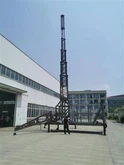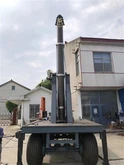tower technology
Traditionally, overhead transmission lines have been constructed using lattice steel structures. The towers are structurally stable and time-tested solutions, so there is no logical reason to consider change. However, in recent years, plans for new transmission line corridors with latticed steel structures have been delayed considerably due to ROW and aesthetic concerns.
Critical transmission corridors require solutions with narrow corridors and small footprints. Replacing traditional latticed steel structures with monopoles is an important step in this direction. Elia did not consider other types of structures, such as pull-wire structures, as they are only allowed for temporary structures in Belgium.
For the tawo project, it was decided to compare concrete poles with a traditional latticed steel structure. Here are some advantages of concrete poles:
Decrease ROW width
Smaller foundation and smaller footprint, taking up less land
Fewer components and faster installation
Significant wind load capacity and reduced risk of localized failures as it has a much lower number of components
Circular and faceted designs reduce wind loads
Improved visual appearance and aesthetics more acceptable depending on proximity to public property
Excellent reliability in extreme wind conditions as deformation may occur but complete failure is unlikely
More flexible (in the event of a conductor break, the larger deflection properties of the concrete rod reduce tension in the affected span and bending at the base)
Less maintenance as no painting is required except for metal parts.
On the other hand, here are some disadvantages of concrete poles:
The accessibility and logistics of the website must be assessed.
More difficult to fit due to the added height and reinforcement.
There is no way to see through the concrete pole, which can be a hindrance from a visual standpoint.
Concrete is much heavier than other structural types.







